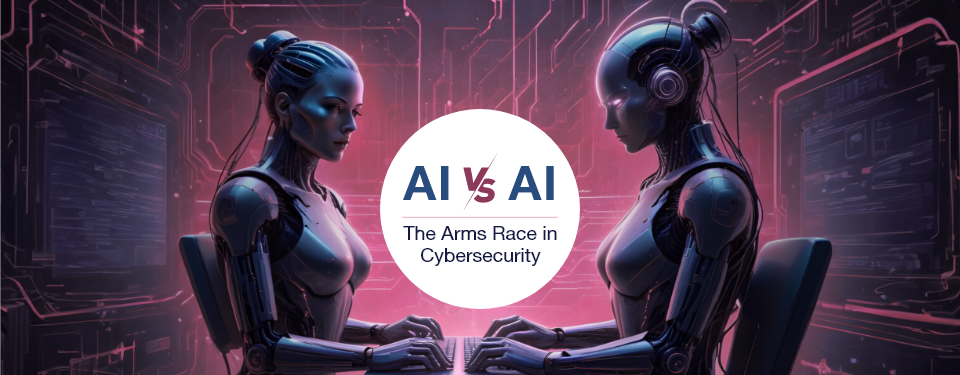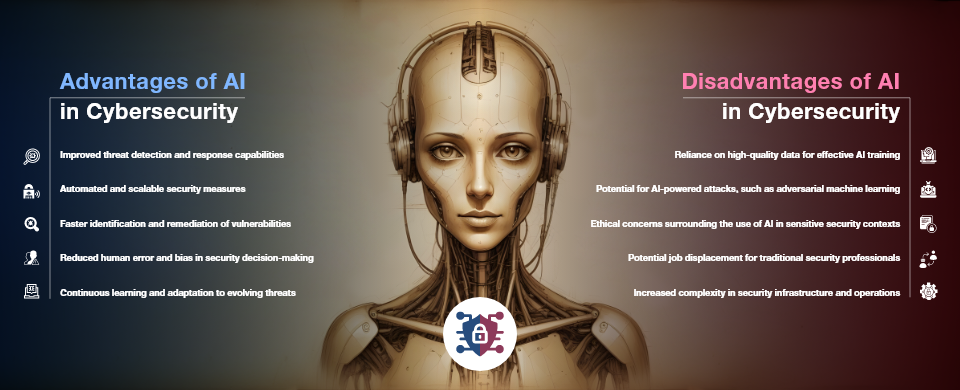
Posted On July 07 2024 | 12:35
Artificial Intelligence (AI) has been a game-changer in the realm of cybersecurity, revolutionizing the way we approach the ever-evolving landscape of digital threats. As the digital world continues to expand, the need for robust and adaptive security measures has become paramount. AI, with its ability to learn, adapt, and make decisions autonomously, has emerged as a powerful tool in the arsenal of cybersecurity professionals.
Cybersecurity has long been a cat-and-mouse game between hackers and security professionals, with each side constantly seeking to outmaneuver the other. However, the introduction of AI has transformed this dynamic, providing both attackers and defenders with unprecedented capabilities.
AI-powered cybersecurity solutions can analyze vast amounts of data, detect anomalies, and respond to threats in real-time, far outpacing the capabilities of traditional security measures. By leveraging machine learning algorithms and deep neural networks, these systems can identify patterns, predict potential attacks, and automate defensive actions, making them a formidable force in the fight against cybercrime.
The integration of AI in cybersecurity has sparked an intense “arms race” between attackers and defenders. Cybercriminals are now employing AI-powered tools to automate and scale their attacks, making them more sophisticated and difficult to detect. On the other hand, security professionals are also harnessing the power of AI to develop advanced threat detection and response systems, creating a continuous cycle of innovation and counteraction.
This AI-driven arms race has profound implications for the future of cybersecurity. As both sides continue to refine their AI-powered capabilities, the stakes continue to rise, with the potential for increasingly complex and damaging cyberattacks.
- Threat Detection and Prediction: AI-powered systems can analyze vast amounts of data, identify patterns, and detect anomalies that may indicate potential cyber threats. These systems can then predict the likelihood of future attacks, enabling proactive defense strategies.
- Automated Incident Response: AI-driven security solutions can autonomously respond to detected threats, implementing countermeasures, isolating affected systems, and initiating remediation processes, reducing the time and resources required for manual intervention.
- Malware Analysis and Classification: AI algorithms can be trained to identify and classify various types of malwares, helping security teams understand the nature of the threat and develop appropriate mitigation strategies.
- User Behavior Analysis: AI can monitor user activities and patterns, identifying deviations that may suggest compromised accounts or insider threats, enabling early detection and response.
- Network Anomaly Detection: AI-powered network monitoring systems can identify unusual traffic patterns, potential vulnerabilities, and suspicious activity, helping to maintain the integrity and security of an organization's digital infrastructure.
- Vulnerability Identification and Patching: AI can be used to continuously scan for vulnerabilities, prioritize them based on risk, and automate the patching process, reducing the window of exposure for organizations.

As the AI-powered cybersecurity arms race continues to unfold, the future of this domain holds both promising and concerning developments. On the one hand, the ongoing advancements in AI technology are likely to lead to even more sophisticated and effective security solutions, capable of anticipating and thwarting increasingly complex cyber threats.
However, the potential for AI-powered attacks, such as adversarial machine learning and automated hacking, also raises significant concerns. Cybercriminals may leverage AI to create more evasive and damaging attacks, challenging the ability of security teams to keep up.
- Bias and Fairness: AI systems can perpetuate and amplify existing biases, leading to unfair or discriminatory security practices. Ensuring the fairness and transparency of AI-driven decision-making is crucial.
- Privacy and Data Protection: The collection and analysis of vast amounts of data by AI-powered security systems raises concerns about individual privacy and the potential for misuse or unauthorized access to sensitive information.
- Accountability and Transparency: As AI systems become more autonomous in their decision-making, the issue of accountability becomes increasingly complex, with questions about who is responsible for the consequences of AI-driven actions.
- Dual-Use Concerns: The same AI technologies that enhance cybersecurity can also be weaponized by bad actors, leading to the potential for misuse and unintended consequences.
Governments around the world play a vital role in shaping the future of AI in cybersecurity. Policymakers and regulatory bodies must strike a delicate balance between fostering innovation and ensuring the responsible and ethical use of these technologies.
Some of the key areas where governments can contribute to the regulation of AI in cybersecurity include:
- Establishing Ethical Guidelines: Developing clear and comprehensive guidelines for the ethical development and deployment of AI-powered security solutions, addressing issues such as bias, privacy, and accountability.
- Promoting Transparency and Accountability: Implementing policies and regulations that mandate transparency in the use of AI in cybersecurity, ensuring that organizations can be held accountable for the decisions and actions of their AI systems.
- Investing in Research and Development: Providing funding and support for research into the intersection of AI and cybersecurity, fostering innovation and the development of next-generation security technologies.
- Facilitating Cross-Sector Collaboration: Encouraging collaboration between government agencies, private companies, and academic institutions to share knowledge, best practices, and emerging trends in AI-powered cybersecurity.
- Enforcing Cybersecurity Standards: Establishing and enforcing robust cybersecurity standards that incorporate the use of AI, ensuring a consistent and effective approach to digital defense across different sectors and organizations.
The battle between AI-powered attackers and defenders in the cybersecurity domain is an ongoing and ever-evolving struggle. As cybercriminals continue to leverage AI to automate and scale their attacks, security professionals must respond with equally sophisticated AI-driven solutions to protect against these threats.
The integration of AI in cybersecurity has become a critical component of modern digital defense, providing organizations with the tools and capabilities necessary to navigate the complex and rapidly changing landscape of cyber threats. By harnessing the power of AI, security teams can enhance their threat detection, response, and mitigation capabilities, staying one step ahead of the adversaries.
However, the ethical and regulatory challenges surrounding the use of AI in this domain must be addressed to ensure that these technologies are developed and deployed in a responsible and transparent manner. Collaboration between governments, private companies, and academia will be crucial in shaping the future of AI-powered cybersecurity and ensuring that the benefits of these transformative technologies are realized while mitigating the potential for misuse and unintended consequences.
Stay ahead of the curve in the AI-powered cybersecurity arms race. Visit www.peopletech.com or write to is at info@peopletech.com to receive the latest insights, trends, and best practices in AI-driven security solutions.
